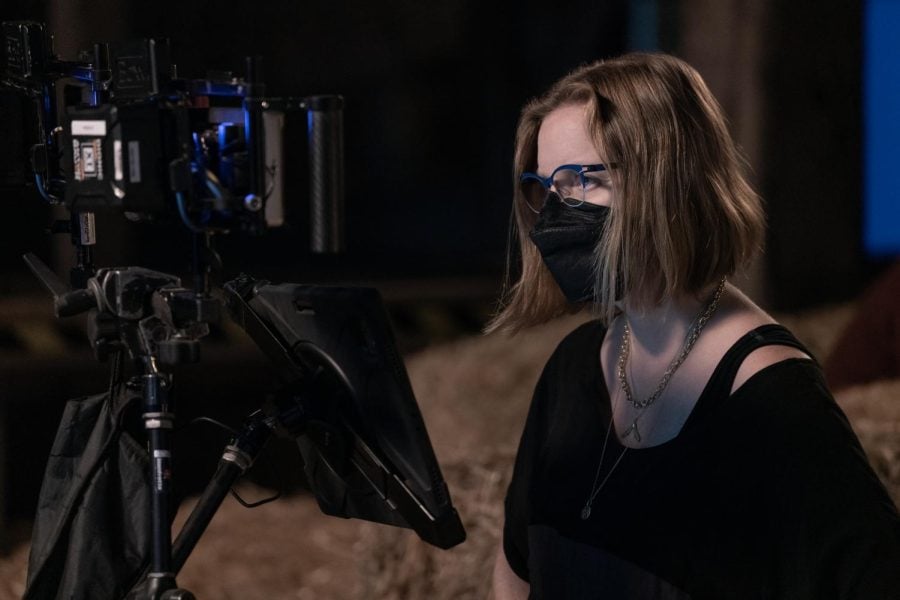Q&A: Sarah Polley, writer and director of “Women Talking,” discusses her creative process
Photo courtesy of United Artists Releasing
Writer-Director Sarah Polley on the set of “Women Talking.”
November 17, 2022
Content warning: This article contains mentions of sexual assault.
Written and directed by Sarah Polley, “Women Talking,” is a new drama following a group of women in a religious colony as they reconcile their faith amid violence and sexual assault in their community. The film, based on the novel by Miriam Toews, premiered at the Telluride Film Festival in Colorado last month.
The Daily spoke with Polley about her writing and filmmaking process.
This interview has been lightly edited for clarity and brevity.
The Daily: What drew you to want to adapt the novel for the screen?
Polley: The book made me ask a lot of questions — the kind that change your life. I was fascinated by how Miriam took questions we were asking at that moment in the zeitgeist and made them bigger and more complicated. It hit me with this profound force, and I loved the idea of seeing if that could be captured in a film.
The Daily: The film reflects on Phillipians 4:8, “Whatsoever things are true,” as a pivotal reason for the womens’ decision to leave the colony. This verse is also Northwestern’s official motto. What does the verse mean to you, and how is that illuminated throughout the film?
Polley: I discovered that verse through Miriam’s book, but it’s on my fridge now, and I think about it every day. It’s kind of a North Star for me in terms of how to find a way forward, especially when things are bleak. There are many corrupt hierarchies, and sometimes we look at that and conflate faith with its structures. Sometimes the two things have very opposing interests. This verse became the guiding force of the film because that’s what these women moved towards. This isn’t a film about people rejecting their faith. It’s about people figuring out how to honor their faith, and how to honor themselves in relation to their faith.
The Daily: Can you talk about the dramatic storytelling moments and how you chose to present moments of sexual assault?
Polley: I thought the most important part was the impact that the assaults had on the women and what trauma like that does to the brain. I never wanted to flash back to the assaults themselves. I was interested in flashing back to that moment after an assault where you’re in shock, and your brain is unable to process what has happened. Nothing can be properly consigned to memory, and it’s just a mess. Ultimately, the film is about the impact these events have on the women, what they choose to do with it and how they move forward together.
The Daily: How did you weave in the different perspectives and beliefs of these characters?
Polley: (The film) is a conversation among really different people who have really different responses, and they have to work together. I think we’re getting to a point right now where, if we don’t agree with each other on every single issue, we can’t work together. That’s why I think we’re not getting as far as we could in terms of progress in the world. The way (the characters) make room for the messiness of each other’s viewpoints, even when they vehemently disagree, is why they’re able to move forward.
The Daily: What was the most rewarding part of this experience as a filmmaker?
Polley: Getting to watch these actors work together was unlike anything I’ll ever experience again. It was the most extraordinarily ego-less community that they created together. I would sit there by myself in the empty, dark studio after work every night and try to absorb it.
The Daily: What do you want people to take away from this film?
Polley: I’m really interested in the hope that people are thinking as much about the world they’d like to build as the one they want to tear down. Not just what they want to destroy, but what they want to achieve. I’m interested in this concept of what a real democracy looks like. A real democracy looks like really rich, difficult conversations and true, meaningful consultation with people who don’t agree with you, figuring out a way forward together. I think that’s the process these women engage in. It’s a very democratic conversation in all of its messiness, ugliness and truth, and the possibility that they could maybe move towards something better.
Email: andresbuenahora2024@u.northwestern.edu
Twitter: @andresbuena01
Related Stories:
— Q&A: Lila Neugebauer discusses “Causeway,” working with Jennifer Lawrence and more
— Cooper Raiff talks comedy, writing and new film ‘Cha Cha Real Smooth’
— Q&A: Mark Wahlberg talks faith, career and new movie ‘Father Stu’



